
Sunday, March 22, 2015, at 1 PM
The Parish House of the Church of the Ascension,
12 West 11th Street, just west of Fifth Avenue
ASCENSION OUTREACH INC.
In Collaboration with RESISTANCE CINEMA
To commemorate the 50th anniversary of “Bloody Sunday” in Selma, Alabama
and passage of the l965 Voting Rights Act
Presenting two films
FREE AND OPEN TO THE PUBLIC
BRIDGE TO FREEDOM (1965) -
Blackside, Executive Producer HENRY HAMPTON (1987, 58 min)
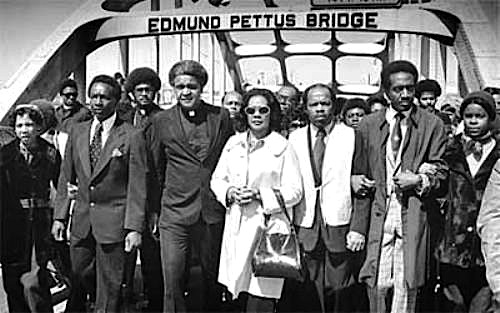
This hour-long episode from the PBS documentary Eyes on the Prize, is narrated by Julian Bond and was produced by Blackside. Efforts by blacks in Mississippi and Alabama to register to vote took place over many years. Using actual footage, this film captures some of the movements’ most crucial protests in Alabama, including Selma, and follows the fight for voting rights to the highest corridors of power, climaxing with the signing of the l965 Voting Rights Act.
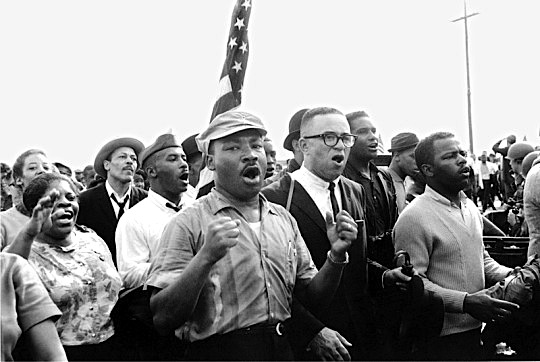 On March 7, demonstrators start a 54-mile march in response to an activist's murder. They are protesting his death and the unfair state laws and local violence that keep African Americans from voting. Led by SNCC activists John Lewis and Hosea Williams, about 525 peaceful marchers are violently assaulted by state police near the Edmund Pettus Bridge outside Selma.
On March 7, demonstrators start a 54-mile march in response to an activist's murder. They are protesting his death and the unfair state laws and local violence that keep African Americans from voting. Led by SNCC activists John Lewis and Hosea Williams, about 525 peaceful marchers are violently assaulted by state police near the Edmund Pettus Bridge outside Selma.
Television networks broadcast the attacks of "Bloody Sunday" nationwide, creating outrage at the police,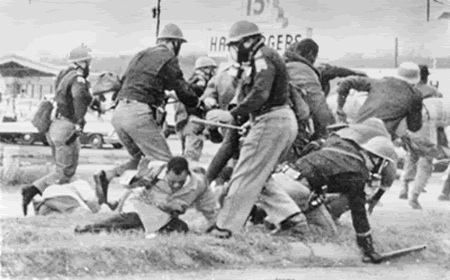 and sympathy for the marchers. Alabama police turn back a second march, led by Martin Luther King, Jr. and other religious leaders, on March 9th. Following a federal judicial review, the march is allowed to resume, escorted by the National Guard. On March 25, 25,000 marchers arrive at the State
and sympathy for the marchers. Alabama police turn back a second march, led by Martin Luther King, Jr. and other religious leaders, on March 9th. Following a federal judicial review, the march is allowed to resume, escorted by the National Guard. On March 25, 25,000 marchers arrive at the State 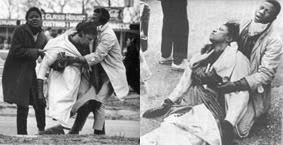 Capitol building in Montgomery. Soon afterward, the U.S. Congress will pass the Voting Rights Act of 1965, forcing states to end discriminatory voting practices.
Capitol building in Montgomery. Soon afterward, the U.S. Congress will pass the Voting Rights Act of 1965, forcing states to end discriminatory voting practices.
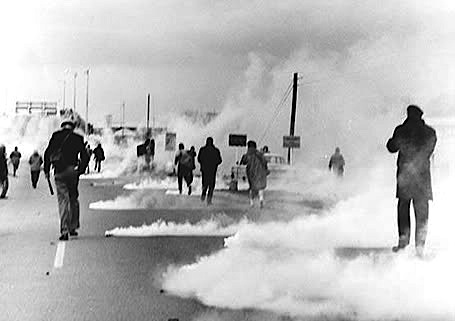
PLUS
TWO TAKES ON THE ELDERS REVISITED by MELINDA HOLM (2005, 28 minutes)
Special guest Melinda Holm produced and directed this short film featuring reminiscences by two black women and two white men about the dramatic events in 1960’s Selma. The origins of the Voting Rights Movement in Selma and events of 1965 told by Mrs. Amelia Boynton Robinson, beaten by police on "Bloody Sunday" supplemented by Miss Annie Cooper, played by Oprah Winfrey in the recent film "SELMA". Both were in their 90s when interviewed. Further elaboration comes from white gallery owner Mr. Jerry Siegel and a Selma policeman known since his March 1965 full page closeup in Life magazine as "Cigar Charlie".
In a post-screening discussion with Melinda Holm, we will review the significance of the l965 Voting Rights Act against the backdrop of the Supreme Court decision to strike down some of its provisions.